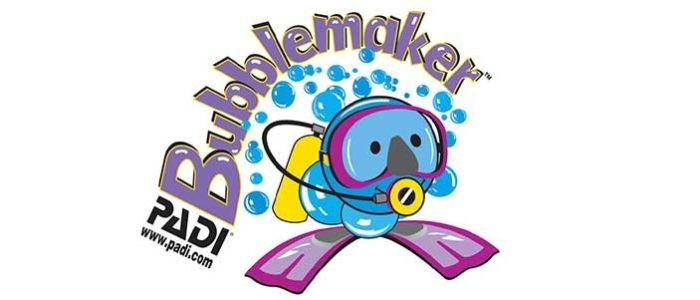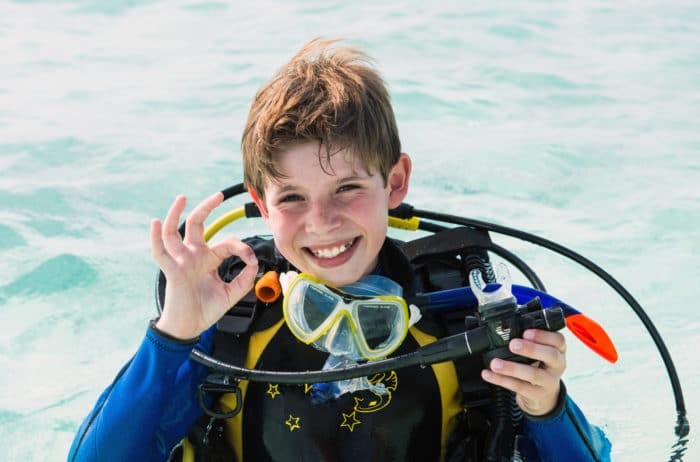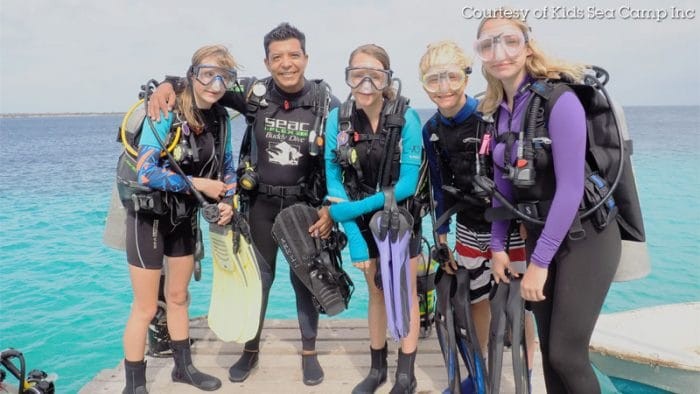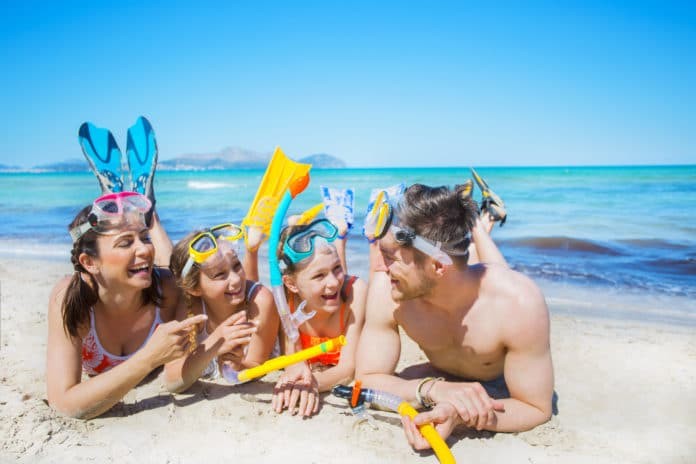One of the greatest things about being a parent is the ability to share the things that you’re passionate about with your children. If one of those things happens to be diving, it’s likely that you’ve thought about introducing your kids to the sport. It is possible – there are several scuba programs and courses designed specifically with children in mind. Diving can be a hugely positive experience for young people. It teaches them focus, responsibility, and confidence, while also reinforcing classroom concepts including physics and maths. In this article, we look at the best way to approach scuba diving for kids.
Scuba Courses for Kids
PADI offers a choice of youth programs for kids aged eight and older. The most basic of these is the PADI Bubblemaker program, which allows children to experience the thrill of breathing underwater in a confined environment no deeper than 2 meters/ 6 feet. The PADI Seal Team program is more comprehensive. Also hosted in a swimming pool, it consists of a series of AquaMissions that cover basic scuba skills as well as specialty adventures – ranging from search and recovery to aquatic life identification.

If you want your children to become fully certified, you’ll need to wait two more years. At 10, they can enroll in the PADI Junior Open Water Diver course. This is exactly the same as the adult version, only with additional restrictions after qualifying. Kids aged 10 to 11 can only dive with a certified parent, guardian or PADI Professional, and must not exceed 12 meters/ 40 feet. Children aged 12 to 14 must dive with a certified adult over the age of 18. When they reach 15, these restrictions are lifted and they are automatically upgraded to full Open Water Diver status.
Other training organisations also facilitate scuba diving for kids. Check out SSI’s Scuba Rangers or SDI’s Future Buddies courses, both of which start as early as eight years old.
Is Your Child Ready to Dive?

While organizations like PADI, SSI, and SDI offer full dive courses for kids as young as 10, it doesn’t necessarily mean that that’s the right age for every child to start diving. Only you know whether your child is physically and emotionally mature enough to deal with the ups and downs of an entry-level course. It’s an important question to answer correctly because encouraging a child to dive before they’re ready is both dangerous and counter-intuitive. If they find the course scary, confusing or intimidating, the chances are that they’ll be put off the sport for life.
So, how do you know if your child is ready? Firstly, they must be able to pass the medical questionnaire stipulated as a PADI Junior Open Water Diver course requirement. They need to be able to pass the swim test – which involves treading water for 10 minutes and swimming for 200 meters (or for 300 meters with the aid of a mask, fins, and snorkel). Confidence in the water is key. They also need to be outgoing enough to be able to interact with an instructor, who will most likely be a complete stranger. It is vital that your child feels comfortable enough to speak up when they don’t understand, or when something is wrong.
Similarly, they need to be able to pay attention long enough to listen to their instructor, both in the classroom and in the water. Your child also needs to have the mental capacity to understand the theoretical side of the course. Bear in mind that the material they will be learning from is the same material you once used – there are no special books for kids. They can ask for help and take as long as they like to master the theory, but a good understanding of dive principles is essential for their safety. Most importantly, your child has to want to dive – for themselves, as well as for you.
Choosing The Right Dive Centre
Choosing the right dive operator is also important. Arrange to meet with prospective instructors before signing up for a course, so that you can gauge their compatibility and also ask about their experience with teaching scuba diving for kids. Although safety is paramount, you need an instructor who will make the experience fun – if it feels too much like school, most kids will swiftly lose interest. Make sure to ask about class sizes and instructor-to-student ratios, and to find out what the terms are if your kids end up needing a few extra days to master their theory or in-water skills.
It’s important that your kids don’t feel rushed or pressurized. If they’re going to have a lasting relationship with scuba diving, it has to be something that’s done on their terms.
Deciding on a Destination
If you’re planning on signing your kids up for a scuba course while on a family holiday, picking the right destination is also important. You might be desperate to explore the shark-filled waters of South Africa or the tearing currents of Komodo, but realistically you need to choose a spot with the best conditions for novice divers. We all know how frightening bad visibility or strong current can be the first time around – and if your kids get scared, they may not want to get back in the water. Choose somewhere warm with calm, clear seas and an abundance of shallow, sandy dive sites.
It’s also a good idea to choose a destination with family-friendly activities on land, too. That way, the trip will be remembered as an overall success for everyone involved. If you’re stuck for ideas, look up Kids Sea Camp, an initiative set up by diving mum Margo Peyton. Now in its 17th year, the company organises scuba-oriented family holidays to Caribbean destinations with plenty to do both under and above the water. Packages include accommodation, activities, snorkelling and scuba programs for the kids, as well as fun dives for Mum and Dad.

You’ll be diving with other families, allowing your kids to make friends and share their experiences with people their own age. It’s a great way to crank up the fun factor while making the learning curve less overwhelming.
The Importance of Equipment
Lastly, scuba diving for kids is hugely simplified by having the right equipment. Children are much more susceptible to the cold than adults, so a well-fitting wetsuit is essential. Often, dive centers will have a limited selection of smaller sized gear, so consider buying soft gear (including a wetsuit, fins, and snorkel) in advance. Finding the right mask is especially important. If the one they’re given is uncomfortable or worse, leaks, the thrill of that initial underwater experience can quickly be erased by panic.
If you don’t want to fork out for the more expensive equipment (such as a child’s BCD or smaller cylinder) before your kids have even tried diving, make sure to contact your dive center ahead of time. You can find out whether they have child-friendly equipment for hire, and if they don’t, make alternative arrangements prior to your arrival.

